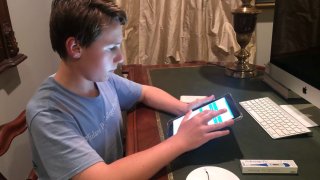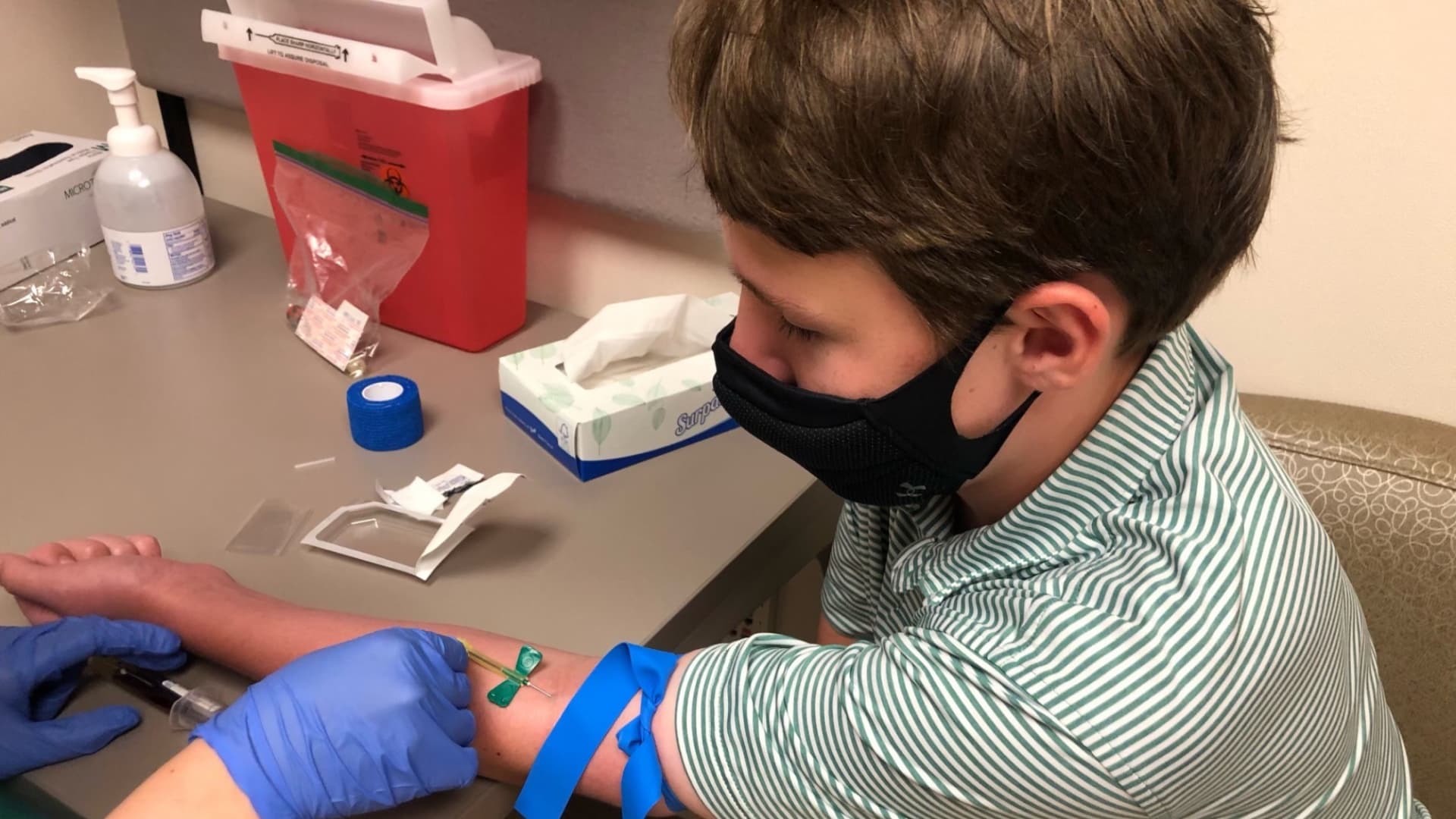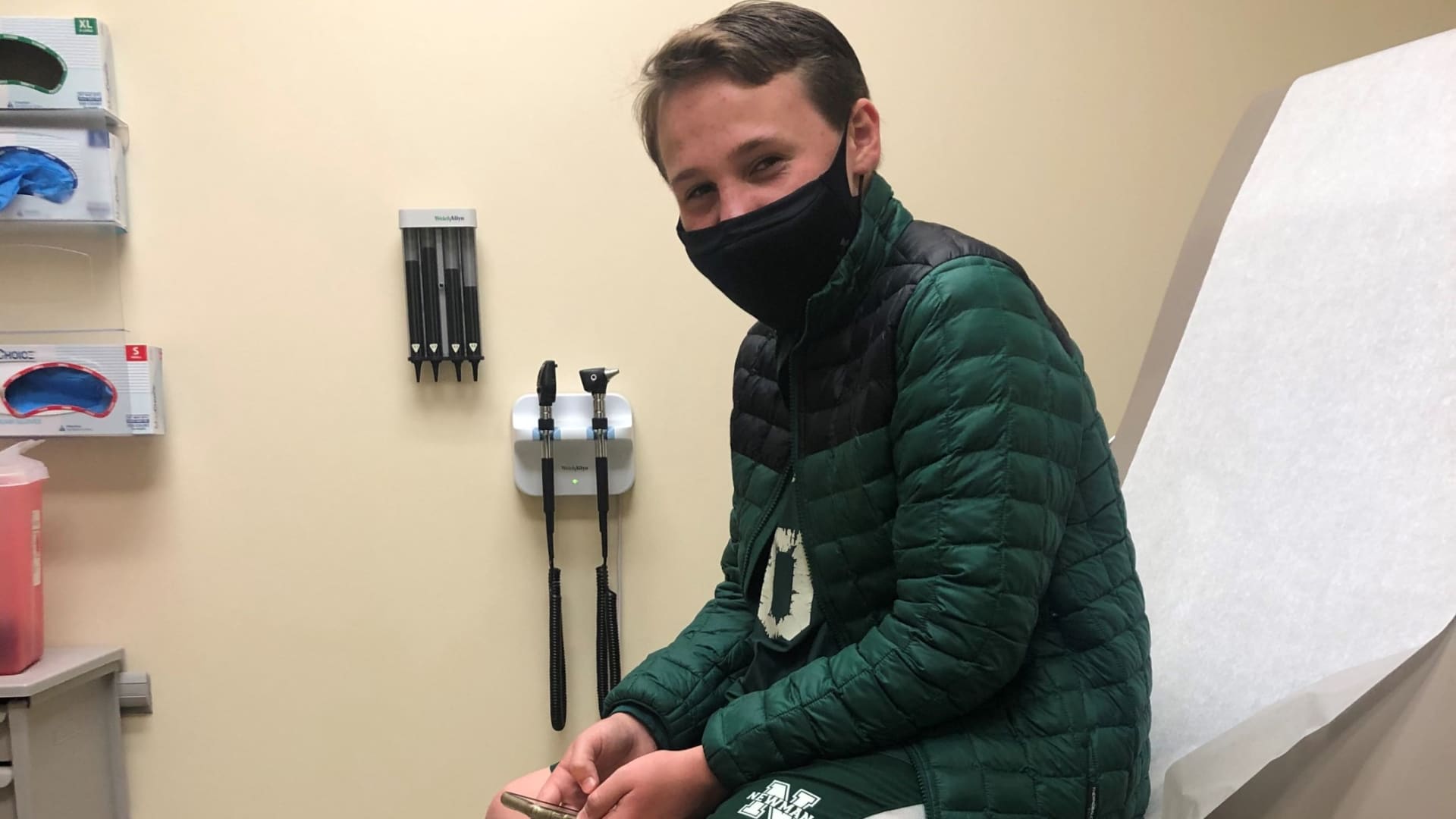
Epidemiology is not high on your average teen's list of hobbies. But it is for Andrew Brandt, a 13-year-old who lives in New Orleans and is enrolled in Pfizer's Covid-19 vaccine trial for children.
"When the pandemic started, it was sad because I did want to help people and I just kind of felt like I really couldn't do that," Andrew tells CNBC Make It.
Finding the Pfizer trial for his age group felt like a tangible way to pitch in, and also fit his interest in science and medicine.
In the beginning of 2021, Andrew asked his mom if he could enroll in the trial. At the time, Pfizer's Covid vaccine had already been approved for emergency use in people over 16, and the company was recruiting younger volunteers ages 12 to 15.
"Initially, it was agony" deciding whether or not to let him enroll, Christine Brandt, his mother, tells CNBC Make It. "What kind of parent is like, 'Yes, please use my child as a guinea pig?'"
Andrew had done a lot of research about how mRNA vaccines work and the potential risks of being in a clinical trial. "I like to try a lot of things and learn everything I can," he says.
Get Tri-state area news delivered to your inbox.> Sign up for NBC New York's News Headlines newsletter.
After relaying his findings to his parents, the family consulted with everyone from his doctors to grandparents to family friends who are physicians before making the decision.
What it's like to be in a clinical trial at 13

In early January, Andrew and his mom went to Ochsner Medical Center for his first dose of the vaccine or placebo.
Money Report
"I was pretty calm because I was in the second stage, so they deemed it almost certainly safe," Andrew says. "I knew that if I got sick, it wouldn't be the end of the world."
He was sent home with a paper disc used to measure any redness or swelling where he got the shot, as well as an app to use to keep track of his symptoms each day.
Though neither trial participants or researches officially know whether Andrew got the vaccine or a placebo (it's a double-blind trial), Andrew says he had a robust response after receiving the first injection. He says he had a fever, felt sore and fatigued and had pain around the injection site.
Within 36 hours, the symptoms "abated instantly, as if a light switch had turned them off," his mother says.
At school, Brandt's friends and teachers (who weren't yet eligible for the vaccine), wanted to know about his experience.
"A lot of my friends just had lot of questions because, I mean, it's not something that we just know a lot about or are taught," Andrew says. As it turns out, one of his classmates was also in the trial.
Brandt's peers were most curious how the shot felt, if he got sick and whether or not it was worth it, to which "I'd definitely say yes," he says.
Second dose and a Covid scare

On January 27, three weeks days after his first shot, Andrew returned for his second.
With Pfizer and Moderna's mRNA vaccines, the side effects tend to be more pronounced after getting the second dose than the first. This is due to the way the two-dose vaccines work: The first dose is meant to trigger an immune response, and the second dose builds upon it.
After getting his second shot, Andrew had to rush to a soccer championship game. (His team won second place.)
The next morning, Andrew says he had a fever and swollen lymph nodes near the arm where he received the shot. His mom found him lying face-down on the floor, so he stayed home from school.
"It was kind of scary to have a fever; I didn't know how long this thing was going to last," he says. "I had a lot of muscle spasms, so I was basically in the bed for the rest of the day."
Then in late March, Andrew's mother could hear him coughing from his bedroom, which made her panic that something was wrong. Per the trial protocol, they had to contact Pfizer immediately, and courier a sample of a nasal swab to the hospital to test for Covid.
"It was like everybody running around and frantically trying to get records in real time," Christine says. Luckily, the test came back negative.
For the next two years, as part of the trial, Andrew will get his blood tested for SARS-Cov-2 antibodies. If booster shots are needed in the future, he's agreed to receive them from Pfizer, too.
Early interest in epidemiology and medicine
"I've always wanted to do something in epidemiology," Andrew says.
When Andrew was 8, he says he "went down a YouTube rabbit hole" watching TED Talks about the Ebola outbreak that took place from 2014 to 2016. In particular, he was inspired by an Iranian American doctor named Dr. Pardis Sabeti, whose team was responsible for sequencing the Ebola virus genome.
Andrew found more YouTube videos that explained the history of infectious diseases and medicine and was hooked and decided that he wanted to become an epidemiologist.
"The most interesting thing to me is the way that viruses work within the body," he says. (Viruses make people sick by killing cells or disrupting cell function. The body targets the invader by mounting an immune response, often through fever, white blood cells and antibodies.)
Andrew counts John Snow, the "father of epidemiology" who pinpointed the cause of the London cholera outbreak in the 1800s, as one of his inspirations.
Going into high school, Andrew hopes to continue to expand his medical knowledge by taking biology, anatomy and physiology classes. Then, maybe he'll research infectious diseases.
His personal experience with the trial has only fueled his desire to pursue medicine, in particular emergency medicine or trauma surgery.
"I think a good college job weekend job would be to be a paramedic," he says.
Now, thanks to the trial that Andrew participated in along with more than 2,000 other adolescents, Pfizer-BioNTech has data that shows that the vaccine is 100% effective in adolescents age 12 to 15.
The company submitted data to the Food and Drug Administration on March 31 to have its emergency use authorization approved for the younger age group. Dr. Anthony Fauci said that amendment is "imminent," and the hope is that high schoolers could be vaccinated by early fall.
Check out: Meet the middle-aged millennial: Homeowner, debt-burdened and turning 40
Don't miss:






